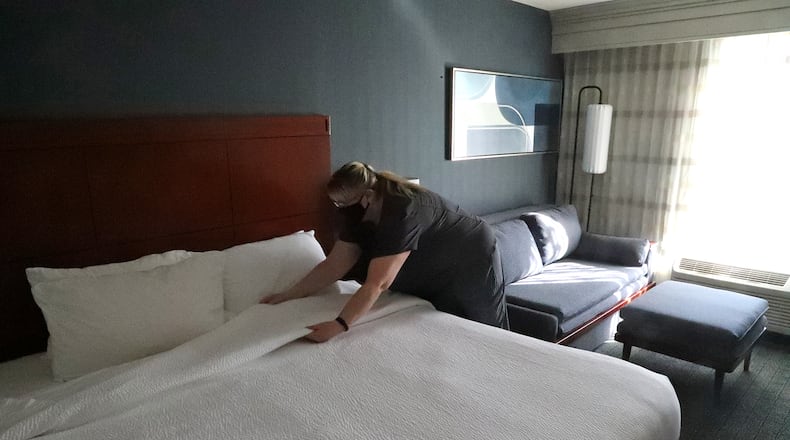In Springfield, one hotel had to drop its staff by 80% at the end of March last year due to the economic impact of the coronavirus pandemic as well as a stay at home order that was implemented around that time.
The Courtyard by Marriott Springfield Downtown largely accommodates a business crowd and saw a drastic decrease in events and hotel stays, according to its general manager Becky Krieger.
She said going into this year, they are seeing more travelers. But the increase is a gradual one. Though the hotel is bringing back employees based on business demands, staffing is currently only half of what is compared to the same period last year.
Credit: Bill Lackey
Credit: Bill Lackey
The Courtyard has 15 full time associates and 17 part time associates. What is happening locally is part of larger statewide trends that has seen the travel and hospitality industry being hard hit by the pandemic.
In December, 80% of job losses reported by Ohio government were from the travel and hospitality industry, the Ohio Travel Association said.
Said Melinda Huntley, Ohio Travel Association executive director: “This industry experienced a devastating 22% unemployment rate in 2020. The unemployment rate in this industry is higher than any other industry in Ohio.”
Chip Rogers, president and chief executive of the Washington, D.C.-based American Hotel and Lodging Association, said in a phone interview that the current situation “might actually be the worst stretch of time financially.”
“We thought the impact of 9/11 was bad, then the financial meltdown of ’08 and ’09 was bad,” Rogers said. “If you combine those and multiply it times 50, it wouldn’t be what this is.”
Hotels will add 200,000 direct operations jobs this year, but will remain nearly half-a-million jobs below the industry’s pre-pandemic employment level of 2.3 million employees, according to the AHLA’s “state of the industry” report for 2021.
In Ohio, job losses peaked in April during government-mandated pandemic shutdowns, when Ohio’s travel and hospitality lost 51% of its jobs, displacing 289,100 Ohioans, according to the Ohio Travel Association.
“With mandates in place prohibiting people from gathering, we saw a drastic decrease in events and hotel stays from March 2020 to the end of the year. We closed our restaurant from the end of March to mid-June,” Krieger said.
“Corporate clients turned to Zoom and other online platforms and sporting events were cancelled. Many weddings or family events were either postponed or changed how they were going to take place,” she added.
The job losses experienced in 2020 are a result of a loss of more than $12.8 billion in business revenue last year, the state association said, citing Tourism Economics data.
Performance venues are permitted the lesser of 15% capacity or 300 people, while meetings and conventions are limited by a state-mandated cap, regardless of venue size or ability to implement social distancing measures, the association said in a release.
“For the vast majority of meetings and events in hotels, the limit is no more than 300 people total,” Joe Savarise, executive director of the Ohio Hotel & Lodging Association, told this news organization. “That’s true no matter how many meeting rooms or how much space you have. Because of additional requirements such as spacing of tables, actual capacity may be less.”
AHLA’s Rogers agreed: “Those capacity limits are very frustrating.”
If precautions are honored — the wearing of face coverings and the maintenance of social distancing — staying at a hotel is no more perilous than staying at one’s home, Rogers said.
The first half of 2021 will probably be the worst period of financial pain for the industry, even worse than 2020, Rogers predicted.
But he expects a gradual improvement in the latter half the of the year, although 2019′s revenue numbers will not be matched for some time.
“We were the worst and first. And we’ll be the last to come out of it,” Rogers said.
Krieger said that her hotel has seen a gradual increase in activity as “ many people are traveling for high school and college sporting events, business travel is starting to increase, and we do see people traveling for leisure as well.”
Prior to the pandemic, Ohio’s travel and hospitality employment enjoyed 20% job growth over the decade, outpacing overall job growth in Ohio of 11 percent, the Ohio Travel Association said.
But daylight may be ahead, Rogers believes.
“If you were ever going to plan a trip, given the prices of airlines and the prices of hotels right now, this would be the best time,” he said. “So if you’re looking forward to your summer vacation, lock that in now.”
He added: “Once we make it out of this, we’ll be in a great position moving forward.”



